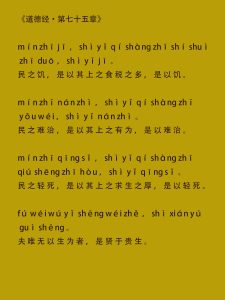Tao Te Ching Chapter 79: The Virtue of Reconciliation

Original Chinese Text
和大怨,必有余怨;
安可以为善?
是以圣人执左契,而不责于人。
有德司契,无德司彻。
天道无亲,常与善人。
Pinyin (Pronunciation)
Hé dà yuàn, bì yǒu yú yuàn;
Ān kě yǐ wéi shàn?
Shì yǐ shèngrén zhí zuǒ qì, ér bù zé yú rén.
Yǒu dé sī qì, wú dé sī chè.
Tiān dào wú qīn, cháng yǔ shàn rén.
Structured Translation & Interpretation
Conflict Resolution Framework
| Approach | Method | Outcome | Modern Equivalent |
|---|---|---|---|
| Surface Reconciliation | Settle major grudges (和大怨) | Residual resentment remains | Peace treaties with loopholes |
| Virtuous Resolution | Hold claims without enforcing (执左契) | Genuine harmony | Restorative justice |
| Cosmic Justice | Heaven favors the virtuous (与善人) | Natural rebalancing | Karma principle |
Two Leadership Models
- 有德司契 (Virtuous Administrator)
- Keeps records but doesn’t punish → Scandinavian prison systems
- 无德司彻 (Tyrannical Collector)
- Enforces harsh settlements → Colonial tax systems
Plain English Paraphrase
- The Limits of Compromise
- “Even the best peace deals leave scars” → Post-WWII Germany
- Solution: “Wise leaders keep accounts but don’t collect”
- The Cosmic Safety Net
- “Nature’s justice favors those who…”:
- Forgive debts (financial/emotional)
- Prioritize healing over punishment
- “Nature’s justice favors those who…”:
- The Bureaucracy Test
- “Good governance eases burdens” (执左契) → Singapore’s CPF system
- “Bad governance squeezes blood” (司彻) → Argentina’s tax history
Key Philosophical Terms
| Chinese | Literal Meaning | Legal/Economic Concept |
|---|---|---|
| 左契 | “Left contract” | Unenforced legal claim |
| 司彻 | “Enforcing taxes” | Predatory extraction |
| 无亲 | “No favorites” | Impartial natural law |
Modern Applications
For International Relations
- “Marshall Plan vs. Versailles Treaty” → 和大怨 vs 执左契 approaches
For Corporate Leadership
- “Debt forgiveness programs” → JP Morgan’s 1895 gold crisis handling
For Personal Growth
- “Holding grudges vs. emotional accounting” → Psychology of forgiveness
“Like rainforest ecology—broken branches feed new growth without debt ledgers.”
— Ecological metaphor for 不责于人
Connections to Other Chapters
- Chapter 63: “Repay injury with kindness” → Complementary teaching
- Chapter 49: “The sage has no constant heart” → Adaptive forgiveness
Would you like:
- Neuroscience of forgiveness studies?
- Historical case studies of debt reconciliation?
- Contrast with retributive justice systems?

One Comment